
Subscribe & stay up-to-date with ASF


With Wild Salmon Watersheds, ASF is focusing on the future of salmon conservation.
The visionary program is designed to adapt to the conservation demands of each watershed, with capacity building being a fundamental tenet. It implies championing the next generation. The landscape has altered; life for my generation is progressively expensive. Thinking multigenerationally, or a century ahead, is not just about investing in projects and programs but crucially, in people.
Climate change is an immense and intricate issue poised to stretch the forthcoming generation of conservationists to our limits. Part of the impetus for my project this year with Rivernotes has been to introduce to you some of the spirited, young, and competent individuals who will stand to defend our cause against the diverse and intensifying challenges wild Atlantic salmon are and will continue to encounter.
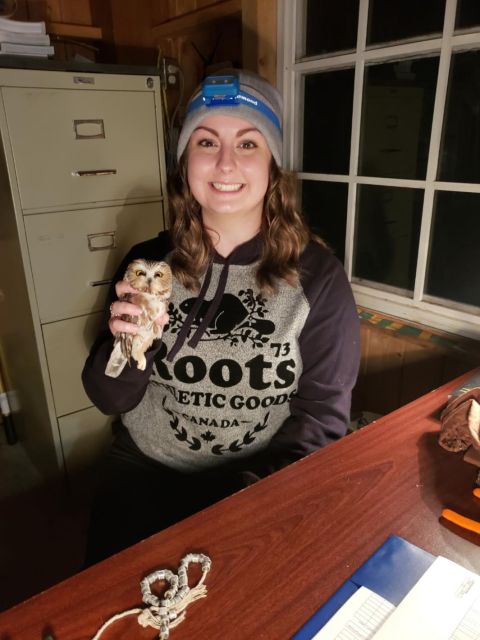
Since her hire in May, I’ve had the good fortune to work alongside an individual exceptionally suited to be a beacon for our generation of conservationists—Kristen Noel, the new Communications Director at ASF. From our initial meeting, it was evident that she had the potential to leave a significant imprint on our field. Some of you might already be acquainted with her through emails or stories she has penned for ASF. However, to introduce her more intimately, I had the distinct privilege of engaging in a conversation with her for this week’s edition.
A Nova Scotia native, Kristen, residing in Annapolis Valley with her lively pup and flock of chickens, transitioned to ASF from the Nova Scotia Invasive Species Council. Her conservation journey commenced in her undergrad years while studying pre-med, sparked by an ornithology course, which made her think, “this would be really cool to do as a job.” Fortunately, a guiding hand, Shawn Craik, recognized and nurtured her potential, opening her eyes to conservation possibilities.
Kristen harbors the aspiration to create a meaningful legacy. In a world overwhelmed with tribulations, she understands that genuine transformation is a collective endeavor. It manifests when individuals coalesce around common objectives to effectuate change, prioritizing the needs of the salmon and acknowledging the reciprocal benefits that ensue when this objective is realized.

Her brief tenure in Atlantic salmon conservation has shown her a realm where core values are not just professed but lived. The purity and passion she has witnessed every time she visits the river, whether it’s fishermen enjoying the riverbanks without casting a line or various organizations collaborating to protect salmon, has reassured her of the existence of a vibrant, resilient community.
Her excitement about contributing to Wild Salmon Watersheds is palpable. The program is a nexus for various stakeholders, each bringing different perspectives, highlighting the extent of commitment to addressing the multitude of challenges facing salmon. It fosters knowledge-sharing and collaborative initiatives, bringing to light the extensive work being executed on the ground.
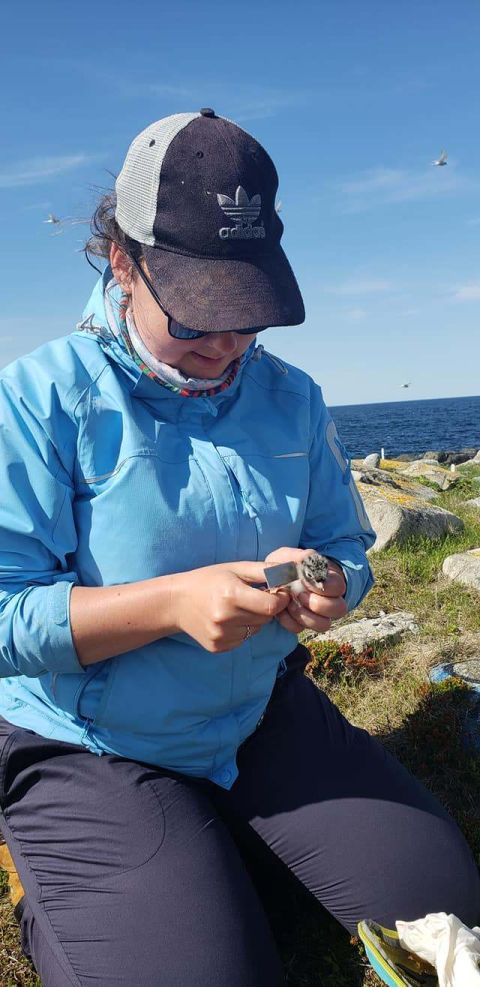
The threats from climate change to salmon species are severe and multifaceted, intertwined with issues like invasive species, habitat destruction, and industrial repercussions. A proactive stance, addressing and stopping threats proactively, is imperative. The intricate nature of conservation efforts and imminent threats underline the need for a unified and focused approach to ensure the endurance and prosperity of wild salmon, as envisioning the future and strategizing are pivotal for conservation. Kristen is uniquely equipped to help lead the charge.
Thank you for being part of the Rivernotes community and tuning in each week as I navigate the stunning, rugged landscapes of salmon country. As always, share the Rivernotes blog with friends who might appreciate these stories. Each share and gift given becomes a ripple that could spark a wave of change.
Please consider contributing to ASF, HERE.
Also, I love hearing from you all, especially those of you who challenge me to do a better job! Please, always feel encouraged to reach out directly to Rivernotes@asf.ca or Pdore@asf.ca with comments, questions, or concerns!
Until next week, stay sharp, and tight lines!
Peter

ASF and Oxbow to host IF4!
Get ready for a night of incredible films and fun giveaways hosted by the Atlantic Salmon Federation at Oxbow Brewing in Portland, Maine on October 10th. The International Fly Fishing Film Festival is an event you don’t want to miss! Plus, admission is free.
Don’t forget to make a donation to ASF to help protect wild Atlantic salmon. Each donation makes you eligible for the awesome gear and swag giveaway at the event!

Wade out of the rivers and into your black-tie best! Join us at the Toronto Club for ASF’s 18th annual Toronto Benefactor dinner on Thursday, October 19th. Tickets are available here.
Additional details:
-Silent auction and reception at 6pm
-Live auction and dinner at 7:30pm
-This year’s guest speaker is Peter Bethlenfalvy
-Black tie encouraged
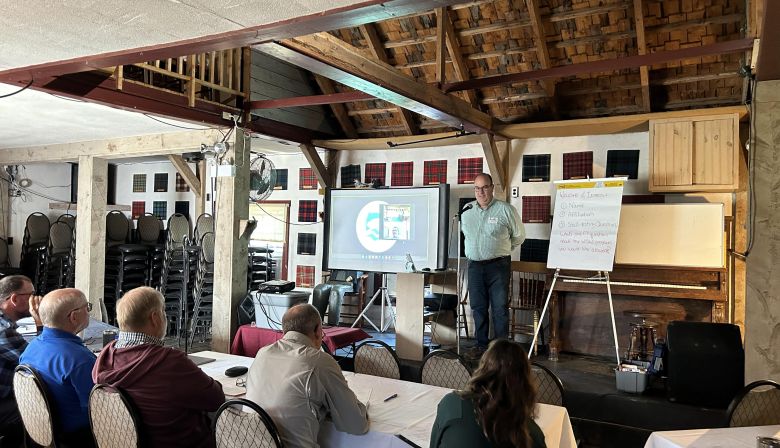
ASF staff, regional councils, and Wild Salmon Watersheds program partners met last week in Cape Breton, Nova Scotia with the goal of connecting and reviewing program progress. We were warmly welcomed and hosted at the Normaway Inn; a quaint lodge nestled in the beautiful Margaree valley. Program partners came from all over Eastern Canada to participate in this conference.
Over the course of three days, we heard from program partners who presented on their organizations and the work that they are doing in their respective watersheds. We learned about ongoing projects, what worked, what didn’t, and what the current focuses are across the region. Networking in this way, with such a broad range of partners facing diverse threats, was a valuable learning experience.
We ended the event with a facilitated discussion on the Wild Salmon Watersheds program. Partners had the opportunity to ask questions, voice concerns, and provide input on the future direction of the Wild Salmon Watersheds program.

Deirdre Green, Nova Scotia Program Director, reports:
Temperatures have dropped notably. It’s now sweater weather in Nova Scotia and anglers are not the only ones to get the memo. Fall salmon runs have begun and fish, along with many leaves, are being hooked on mainland Nova Scotia and Cape Breton Island rivers.
Salmon guide, Robert Chiasson shared this morning: September conditions have been excellent. Even the smaller rivers are seeing an early start to the fall run with good water conditions throughout.
Although the rivers are busy with waded folk, I was able to find a few quiet pools this last week. What a treasure to stand in a river alone and see fresh fish porpoising. With no rain in the long-range forecast, let’s all cross our fingers for reasonable rainfall and an eventful October.
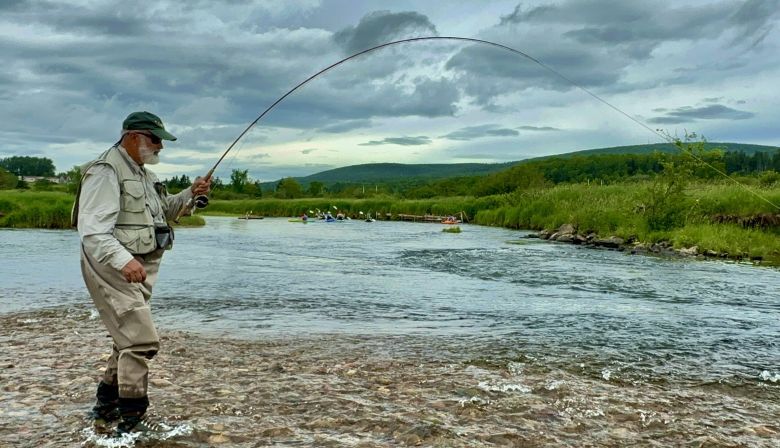
A decade ago, the thought of sharing a salmon pool with a group of kayakers would have been unfathomable. However, this past July during the dog days of summer, my husband, Rudy, and I encountered just that. We found ourselves on the Forks Pool of the Margaree River one sweltering afternoon around 2 pm, well aware that the optimal times for salmon fishing are usually in the early morning or late evening. However, being neither early risers nor twilight anglers, and preferring our dinners at reasonable hours, we decided to give it a whirl.
Luck was on our side that day; Rudy managed to hook a salmon that chose to head downstream, tail walking across the pool. Our attention was quickly diverted by a large group of kayakers navigating down the Southwest branch. Initial thoughts raced to potential line tangles or break offs as they entered the pool, but, to our pleasant surprise, all fourteen kayakers maintained a respectful distance. They transformed into a captive audience, aligning their kayaks to witness the ensuing battle between man and fish.
I took the rod from Rudy, enabling him to tail and release the now tired fish. The moment we released the fish, a wave of applause erupted from the fourteen kayaks, marking an exhilarating and unforgettable moment in time, proving there truly is a first time for everything.

Don Ivany, Newfoundland and Labrador Program Director, reports:
The standard angling season in Newfoundland concluded on September 7, 2023, with Labrador following on September 15, 2023. Currently, limited sections of the Humber, Exploits, and Gander Rivers are available for Fall catch-and-release fishing until October 7, 2023. Anglers should refer to the NL Angler’s guide for precise details on open sections.
Last week, all three Fall rivers experienced warm water temperatures, reaching the high teens in Celsius, and varying water levels. Fishing was reportedly slow, with few new fish sighted. However, following the rainfall from ‘Hurricane Lee’, water levels and temperatures in these rivers have started to see favorable changes, with a slight increase in fish sightings, particularly in the Lower Humber. Despite the sporadic nature of fish sightings and catches, the improved conditions are a respite for the fish after a scorching summer and will facilitate their journey to the spawning grounds.
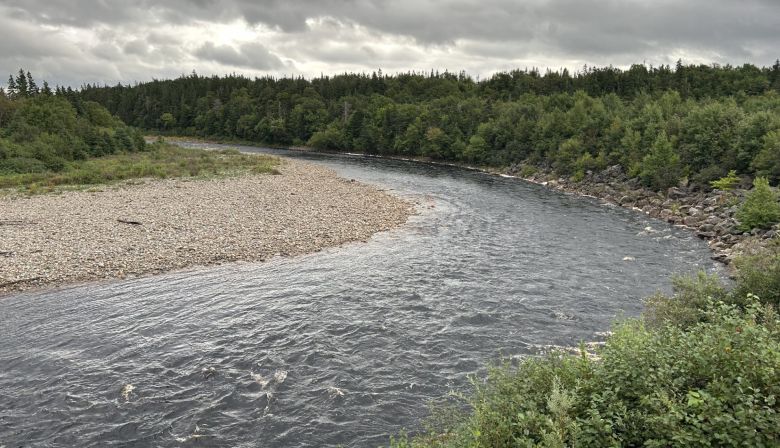
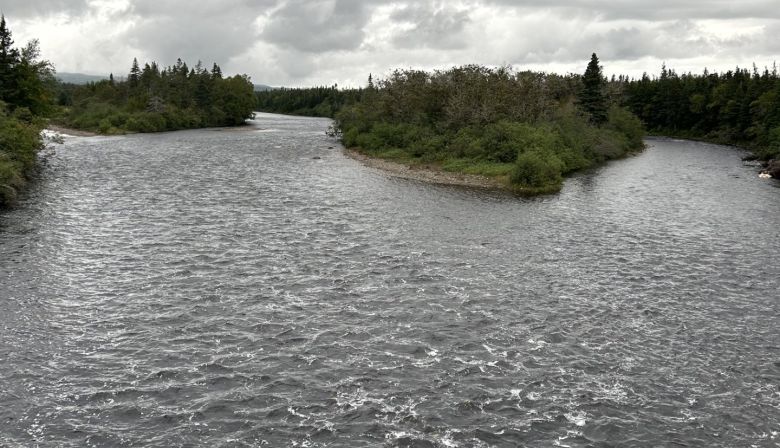
Charles Cusson, Quebec Program Director, reports:
Read the Full Report Complete with Fish Counts, Here. Lisez le rapport complet avec les comptes de poissons, ici.
La saison de pêche 2023 se terminera dans quelques jours, soit le 30 septembre. Les conditions de pêche sont très bonnes en règle générale depuis un certain temps. Pour ceux qui pourront visiter leurs rivières préférées d’ici samedi devrait pouvoir s’amuser une dernière fois.
La saison a été marquée par une diminution marquée au niveau des retours de madeleineaux. Vous trouverez ci-joint un échantillonnage de statistiques de certaines rivières qui sont disponibles au 31 aout.
Certains gestionnaires de rivière ont décidé de ne pas publier les statistiques de pêche pendant la saison, mais iront de l’avant à partager les données de fin de saison d’ici la mi-octobre. Un rapport avec un échantillonnage plus grand vous sera présenté lorsque les données seront disponibles.
Un gros merci aux amies du saumon atlantique qui ont soumis des photos et qui ont partagé leurs exploits et expériences avec Salmo en 2023 entrainant un intérêt grandissant à notre tribune hebdomadaire. Au plaisir de vous revoir en 2024.
Rappel aux saumoniers pêchant les rivières du Québec, prenez le temps de rapporter vos prises et remise à l’eau afin d’avoir des statistiques précises et que les gestionnaires de rivière puissent calculer le succès de pêche avec précision.
Tight Lines!
Les données utilisées dans ce rapport proviennent de divers sites web, des médias sociaux et de source gouvernementale québécois. Les informations peuvent changer sans avis au préalable en ce qui concerne les comparatifs des saisons précédentes.
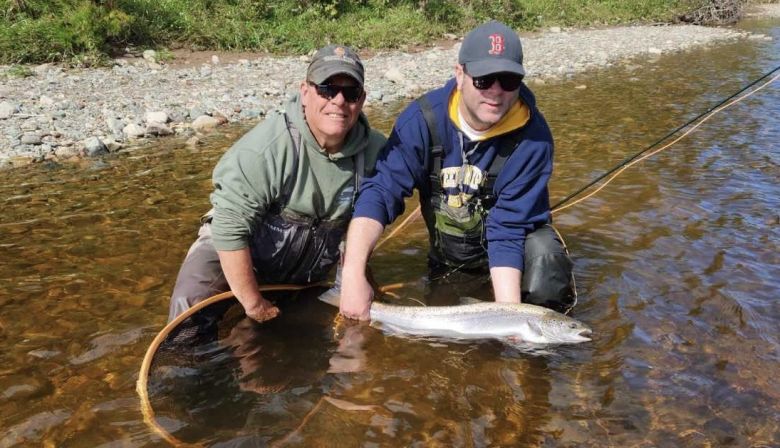
The 2023 fishing season will end in a few days, on September 30th. Fishing conditions have been particularly good for some time now. For those who can visit their favorite rivers between now and Saturday should be able to have one last fun productive outing.
A dramatic drop in grilse abundance has been a subject of discussion not only in Quebe but in the Maritimes and Newfoundland and Labrador.
Please find enclosed a sampling of statistics for certain rivers which are available as of August 31.
Certain river managers had decided not to publish fishing statistics during the season but will share end-of-season data by mid-October. I will provide a more exhaustive and detailed report at that time.
I want to take this opportunity to thank all the friends of the salmon who submitted photos and shared their experiences with Salmo which has contributed to our weekly publication garner more followers. See you in 2024.
Reminder to salmon anglers fishing the rivers of Quebec, please take the time to report your catches and releases to have precise statistics which enables river managers to calculate fishing success accurately.
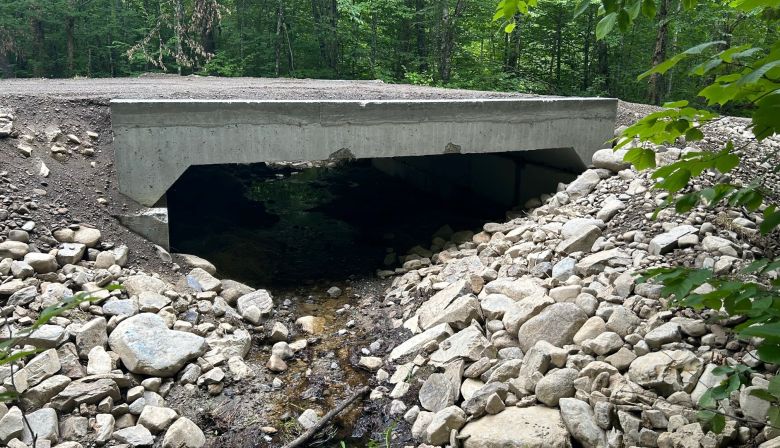
To see an updated report from the Penobscot, click here!
Atlantic Salmon Benefit from Stream Restoration
Access to 13.9 miles of stream habitat has been restored in the Pleasant River Headwaters Forest for endangered Atlantic salmon and Eastern brook trout following the completion of 14 road-stream-crossing projects this summer.
Thirteen of these projects took place on small streams on land owned by the Appalachian Mountain Club (AMC) in the heart of the 100-Mile Wilderness and the final project was located at Henderson Brook in the corridor of the Appalachian National Scenic Trail (AT). The 100-Mile Wilderness is part of the largest contiguous expanse of undeveloped forest in the Eastern United States. This is an area with a high resilience to climate change and an expansive number of lakes and streams with excellent habitat for cold-water fish.
Two of the crossings were decommissioned, and 12 were replaced with open-bottom culverts or large bridges. All the crossings were designed to withstand extremely high stream flows associated with severe weather events, providing resilience for the vital road network connecting recreational lands and commercial forests with the communities of Greenville and Brownville.
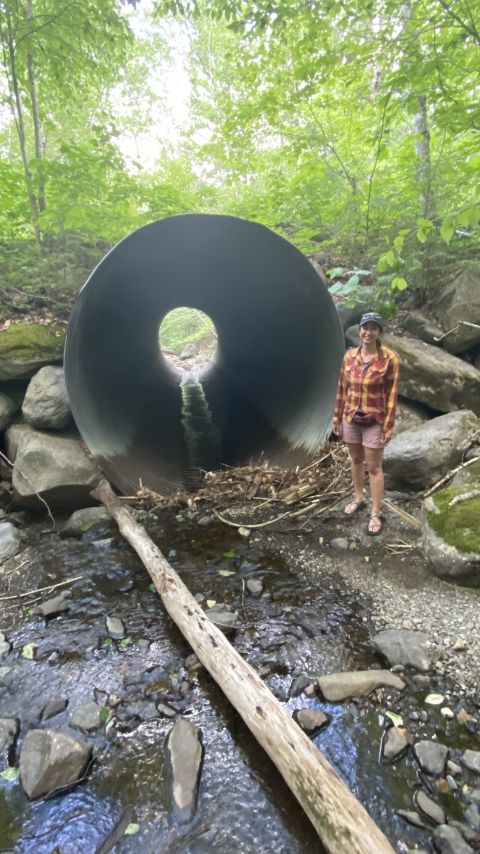
“We are grateful to work with partners to implement conservation projects that integrate recreation, outdoor education, and rural economic development. Paired with our forest management program, watershed restoration expands the impact that our forests have on global ecosystems. Returning sea-run fish to their native homes in a forest that is forever protected is as much about the environmental benefits as it is the right thing to do. The Appalachian Mountain Club is honored to deliver on its mission to foster the protection, enjoyment, and understanding of the outdoors in this way.”
“We are thrilled to be a partner in these projects with AMC,” said John Burrows, the Atlantic Salmon Federation (ASF)’s Executive Director for U.S. Operations. “The Pleasant River has the largest amount of accessible, high-quality habitat for Atlantic salmon in the Penobscot. A quarter century ago, Atlantic salmon could not reach the upper Pleasant because of a gauntlet of 5 dams between Brownville and Veazie. Only one of those dams remain, and Atlantic salmon are now spawning in the upper Pleasant River.”
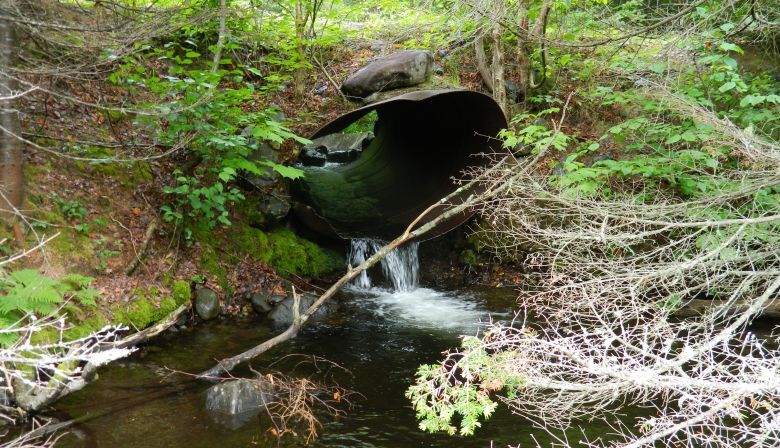
“Reopening rivers and streams to fish migration is critical in the recovery of species like Atlantic salmon,” said Carrie Selberg Robinson, director of the NOAA Fisheries Office of Habitat Conservation. “NOAA is proud to be supporting the work of the Atlantic Salmon Federation and Appalachian Mountain Club to reconnect habitat on the Pleasant River.”
These crossing projects are supported by a grant from NOAA Fisheries with funding made available through the Bipartisan Infrastructure Law and Inflation Reduction Act. Through this funding, NOAA is working to support fisheries and coastal communities across the country through habitat restoration and climate resilience efforts.
The projects were constructed by Sargent Corporation from Orono, Maine, and by William London and Son, of Milo, Maine. Additional partners include the Maine Department of Marine Resources, The Nature Conservancy in Maine, the Appalachian Trail Conservancy, the National Park Service, and Acadia Civil Works.
In 2024, ASF and AMC will complete an additional 12 crossings in the Pleasant River Headwaters Forest.